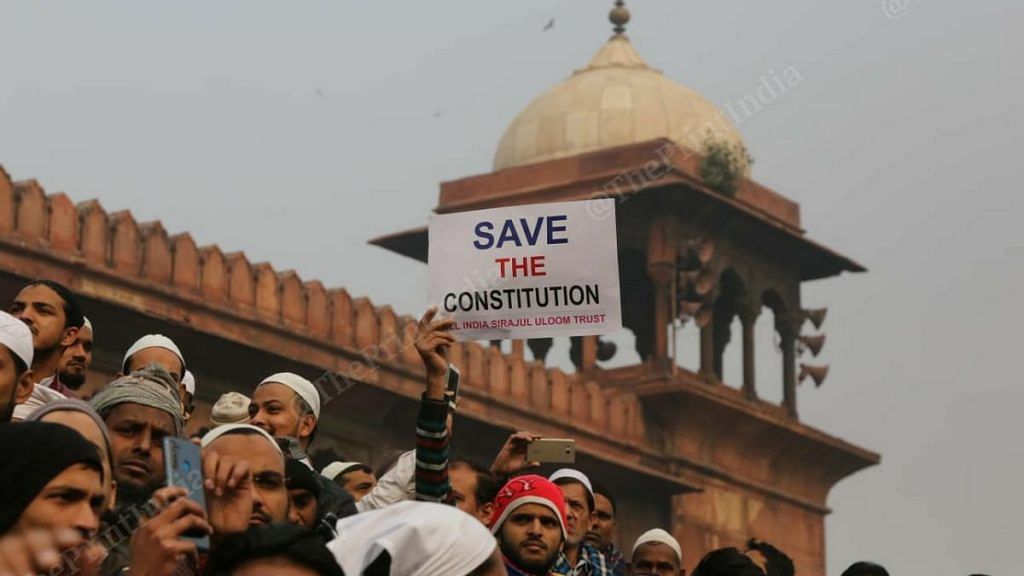New Delhi: The new citizenship law may have worked as a trigger for Friday’s “unprecedented” protest at Delhi’s Jama Masjid attended mostly by Muslims, but it also signals an end to their “patience” level given the current state of affairs, according to clerics and academics from the community.
They said protests against the law will only intensify in the coming days.
The Narendra Modi government’s amended citizenship law seeks to grant citizenship to non-Muslim refugees from Pakistan, Bangladesh and Afghanistan if they faced religious persecution there.
For the past week, protests — some violent, some peaceful — have broken out across the country over the law. The agitation that began in Assam, other parts of the Northeast and West Bengal soon spread to several university campuses — including Jamia Millia Islamia, AMU, Jadavpur University, TISS, IIT-Bombay and IIT-Madras.
On Friday, a massive protest was led by Bhim Army chief Chandrashekar Azad, which saw hundreds of people, mostly from the Muslim community, gathering in and around Jama Masjid, demanding a repeal of the new law.
The crowd at Jama Masjid was large, with protesters carrying posters of ‘Save the Constitution’, Bhagat Singh, B.R. Ambedkar and Mahatma Gandhi, and some also flying the Indian flag.
According to Muslim academics, the Friday’s protest signals a shift in how the community has reacted so far to issues involving them.
Prominent voices from within the community also said that Muslims did not protest after the Babri Masjid was demolished in Ayodhya in 1992 or when the triple talaq bill was passed or even after incidents of lynching of Muslims for allegedly carrying beef, but now their patience has reached a tipping point.
“It seems their patience, like many other sections of Indians, has been tested for far too long. They seem to be coming out of the state of shock and awe. It should have been addressed long ago. It is still not too late,” said S.Y. Quraishi, former election commissioner.
Mufti Mukarram Ahmed, Shahi Imam of Delhi’s Fatehpuri Masjid, said the protests are only likely to intensify across the country.
“Mussalman ka sabr kab tak azmaoge (For how long will you test a Muslim’s patience?). Today’s protest, as also the protests happening elsewhere in the country, is against the attempt to change India’s Constitution,” he added.
Also read: Not Owaisi, not TMC, India’s Muslims must return to Congress after citizenship row
‘Muslims have been pushed against the wall’
Another prominent Muslim voice, Zafaryab Jilani, convener of Babri Masjid Action Committee, told ThePrint the protest at Jama Masjid is a reflection of how their faith in the government has broken.
According to Jilani, Muslims have realised that now, they have been left with no choice but to come out and protest. And the support that they have got from non-Muslims has given them a big boost, he added.
Many among the Muslim intelligentsia said Delhi has not seen such an open show of Muslim solidarity in a long time.
“I do not remember seeing Muslims coming out in such large numbers openly to raise their voice even when their own got lynched or the triple talaq bill was passed. The unprecedented protest in the capital Friday happened because the government is now questioning them on their ‘Indianness’, their right to live in India,” said Supreme Court advocate Anas Tanvir.
Some also drew a parallel between citizenship law protests and the demonstrations that happened way back in 1985 after the Shah Bano verdict in which the Supreme Court upheld her right to alimony, setting off a political battle as well as a controversy about the extent to which courts can interfere in Muslim personal law.
“The two issues are not comparable as Shah Bano case pertained to Muslim personal law and religion. The citizenship law is about allegiance to the country. But that was the only other time that I can think of where people from the community came out on the streets to protest,” said Tanvir Aeijaz, professor of the political science department, Ramjas College.
Aeijaz said he views the citizenship law protests largely as an assertion of Muslim solidarity, where they see themselves being pushed against the wall after the passage of the law.
“Muslims see it as the first attempt by the government to basically disenfranchise them in the long run. They can see their future. Also, Muslims have been looking for a support structure. The support by Chandrashekhar Azad’s Bhim Army has helped,” Aeijaz added.
Also read: Car set on fire, water cannons used as anti-CAA protests turn violent in old Delhi
